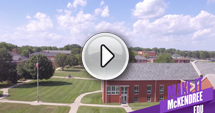Computing Graduates in High Demand
 From software developers to cyber security analysts to video game designers, the opportunities
are endless for graduates in the growing field of Computing. In addition to a booming
job market in this area, McKendree’s unique support system, experienced Computing
faculty, and outside-the-classroom learning opportunities give you an advantage that
ensures success.
From software developers to cyber security analysts to video game designers, the opportunities
are endless for graduates in the growing field of Computing. In addition to a booming
job market in this area, McKendree’s unique support system, experienced Computing
faculty, and outside-the-classroom learning opportunities give you an advantage that
ensures success.
Glance through the list of Computing jobs in the Bureau of Labor Statistics, and you’ll
find that nearly every one of them is anticipated to grow faster than average over
the next 10 years. Information security analyst jobs are expected to rise by an impressive
32% and software developers by 21%. As technology becomes increasingly integral to
our daily lives, the level of job security in Computing will remain among the highest
fields to date.
Equally noteworthy is the higher-than-average salary for Computing jobs. Graduates
in this field frequently pay off student loan debt faster than others, primarily because
they start off earning more right after graduating with their Bachelor’s degree. As
of 2018, the median salary of computer and information technology professionals was
more than $86,000, compared to a median of $38,000 for all other jobs.
McKendree Job Placement Rate in Computing
For McKendree Computing graduates, the hot job market has already had immediate effects
on how quickly they find employment after graduation. In fact, many of our Computing
students receive job offers months before they complete their degree, whether from
a company in which they interned or elsewhere. Our Computing Division is proud of
the fact that 100% of their graduates have consistently obtained jobs in their desired
career field over the last decade.
McKendree’s prime location near St. Louis also enables our students to find unique
internships and employment at a wide variety of major national corporations and government
entities, such as Ameren, Enterprise, BAE, Boeing, and the Federal Reserve Bank. Recently,
St. Louis has also become a central hub for tech start-ups as Silicon Valley investors
have expanded into the Midwest. Whether you’re interested in a career at a large company
or an innovative new start-up, McKendree students are in close proximity to it all.
Customized Real-World Projects Give You Experience Outside the Classroom
Designed to fully prepare you for life in the professional world, our Computing programs
are rooted in coursework that challenges you to think in new ways, as well as opportunities
to apply that knowledge and build your skills outside the classroom.
The STARK program (Student Training and Real-World Knowledge) gives Computing students
the chance to explore areas in which they’re most interested, such as 3-D scanning,
virtual reality, video game development, data science, and website building. All it
takes is expressing a desire to gain more experience in a particular topic, and our
faculty seek to find a project specifically for you.
Clubs and Honor Societies Give You Even More Experience
Interested in robotics? How about cyber security? We have a club for that. Grow your
skills in these exciting areas while working with your fellow McKendree students to
compete against teams from other schools. Our Cyber Defense Team was formed just two
years ago, but has already placed in the top five at the Midwest Regional Cyber Defense
Competition.
McKendree’s Robotics Team, the Association for Computing Machinery, and Upsilon Pi
Epsilon National Computing Honor Society are all great resume-building activities
and organizations that give you experience before you even graduate.
Close Learning Community
Another way we ensure your success is in the strong support network and learning community
thriving within McKendree’s Computing Division. Here you’ll find upper-level Computing
students leading peer tutoring sessions, as well as professors who know you by name
and are available to work with you outside of class.
“The tech industry touches everything, so a lot of our students enter the Computing
Division not sure what exactly they want to do,” said Dr. CJ Dulaney, Assistant Professor
of Computing. “By working on real-world projects and forming close relationships with
professors and peers, they are exposed to a lot of different areas in Computing, whether
it’s a senior talking about his/her internship or a professor pointing them in a direction
they feel they’re excelling. Learning opportunities can happen anywhere, and we learn
best when we’re connected to others.”


